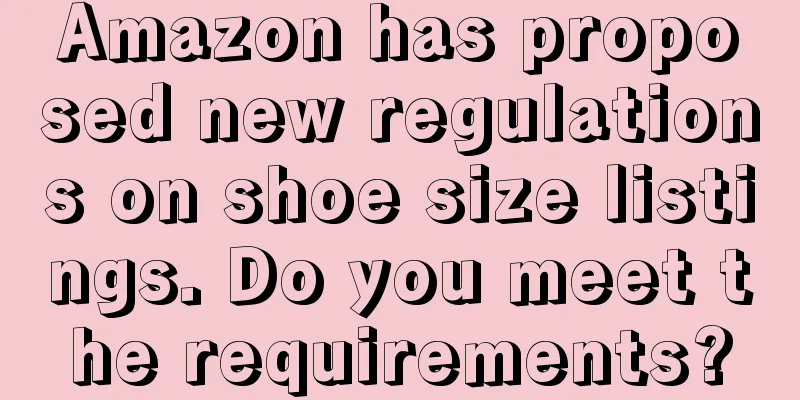Amazon has proposed new regulations on shoe size listings. Do you meet the requirements?

|
Some sellers may wonder what Amazon’s regulations are regarding shoe sizes. So this article will explain in detail why Amazon has made the regulations and the relevant requirements of the regulations.
Whether you are a shoe seller or a consumer buying shoes, when you open certain listings, you will see that the size drop-down menu information is very confusing and not unified. For example, the upper and lower case letters are inconsistent, the forms of indicating half sizes are different, the letters indicating the width of the shoes are different, etc. In a drop-down menu, there are various size expressions such as 7M US, 7½B US, 8 M US and 8.5 (B) US. This menu provides a very poor experience for consumers, so Amazon hopes that each size menu will follow the same consistent size presentation format.
Amazon also answered related questions in the size requirements:
Amazon believes that consumers should be able to understand the size when shopping. Difficult to understand sizes can easily cause confusion to consumers and may lead to product duplication. Products with clear sizes are more convenient for consumers to search by size and width, and the conversion rate is higher than products with confusing sizes. Amazon will provide detailed listing tutorial guides to enable sellers to meet these requirements.
Standardized size display can improve consumers’ search and purchase experience. We found that ASINs with clear and effective size names have higher Glance Views. Consumers are also less willing to buy products with mixed sizes.
If you, a seller, have received this email from Amazon regarding size requirements, it means that the size of the shoes you are selling may not meet the requirements. Therefore, Amazon stated in the email that sellers are required to update the information as soon as possible to comply with the regulations that are about to be implemented. Amazon hopes that sellers will take the initiative to unify size standards. At the same time, it also provides sellers with size tables that are acceptable to the US platform for sellers to compare easily. According to an Amazon email, sellers can modify the size until August 30, 2019. After that, if it does not meet Amazon's standards, the platform will remove the size information from the product details page. Sellers need to standardize sizes to ensure compliance with regulations. In addition, the new sneaker size attribute will be launched on May 30, 2019. Regarding these regulations of Amazon, we recommend that sellers Start adjusting sizes early and plan accordingly. For products that may be sold out before August, you can hold off on adjusting sizes. Consider how you source your products. Don’t buy shoes with mixed sizes yet, and avoid products that will take a lot of time to adjust your listings in the coming months. Obviously, the more ASINs you have, the more you will have to adjust. · For children’s shoes, the sizes of toddler, little kid and big kid should be unified. Unisex shoes (including men's and women's sizes) should be in the same size format European and UK size issues. This is a big problem for sellers who still indicate European and UK sizes. Amazon obviously wants the US platform to only display US sizes and does not accept European and UK sizes. So sellers have to adjust accordingly. Text ✎ Mary/ Statement: When reprinting this article, the title and original text must not be modified, and the source and original link must be retained. |
<<: Starting from scratch, Shopify's 30-day store tutorial - Day 30
>>: Ultimate Guide: How to Sell Seasonal Products as an Amazon FBA Seller
Recommend
A9 algorithm cracked! It only takes 3 days for keywords to appear on the homepage!
Getting keywords on the homepage is a long-term pu...
What is Facebook Shops? Facebook Shops Review
On May 20, Facebook CEO Mark Zuckerberg announced ...
The United States will impose an additional 10% tariff on Chinese goods, effective March 4
On February 27, 2025, local time, US President Tru...
Broken entrepreneurial dream: Two people started Amazon together, but now their relationship has completely broken down! How can I protect my own interests? What should I pay attention to in the content of the share agreement?
Anonymous user My C position Situation summary: Tw...
What is Dhgate? Dhgate Review
DHgate is the first website in China to provide a ...
Black Friday and Cyber Monday are about to start! These shopping factors are the biggest headaches for buyers!
According to a new US consumer survey by BlackFrid...
What is TradPlus? TradPlus Review
TradPlus is a one-stop advertising monetization ex...
Mexico's online payments market is growing exponentially and is expected to reach $21.8 billion in 2024
According to Statista, more than two-thirds of Mex...
Amazon logistics tips to avoid pitfalls!
In the past two years, cross-border e-commerce ha...
16 Amazon product selection analysis indicators and their application methods
The selection of products is just like the auditi...
A girl who returned from overseas pursued her dream of becoming the CEO of Amazon after three job changes
Preface of the Little Clone: After Teacher Alice’...
Walmart Mexico announces Q3 results, net profit down 5% due to increased costs
It is learned that on October 23, Walmart Mexico a...
What is Likealyzer? Likealyzer Review
LIKEAlyzer is a free tool for analyzing Facebook P...
What is a logistics bus? Logistics bus review
Logistics Bus (www.5684.cn) is the first internati...
What is Lifehacker? Lifehacker Review
Lifehacker is a famous American life and software ...









